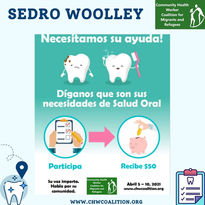
Oral Health and Social
Determinants of Health


The first virtual and bilingual conference
"Addressing oral health among underserved
communities" was held with 50 participants and
the support by the Arcora Foundation in 2022.
Oral Health 2022
In 2022, the Oral Workshop by CHWCMR successfully conducted six workshops aimed at communities, engaging 90 participants across seven Mesoamerican languages: Mixtec, Mam Q'anjb'al, Triqui, Nahuatl, Garifuna, and Purepecha These virtual workshops facilitated by trusted community members and included participants from locations such as Mount Vernon, Burlington, Federal Way, and many others. As part of our educational initiative, we printed and distributed 50 books participants, providing valuable resources for use in schools and communities. Our media campaign effectively promoted these workshops, achieving 1, clicks on Facebook, showcasing our commitment to oral health education and community engagement.










Oral Need Assessment 2021
CHWCMR conducts an Oral Needs Assessment to identify the oral health needs of our community and gauge their severity helping us outline the information necessary for our oral training. We interviewed a total of 91 participants by phone in Spanish from various locations across Washington, including Tri-Cities, Yakima County, Sedro Wooley, King County, Snohomish County, Mount Vernon, Olympia, Pierce County, Skagit County, and Rent. These areas have a significant population of Latinx migrants and refugees. The assessment includes 56 questions covering demographics, health practices, health habits, parental assistance with children's oral, and barriers participants face in accessing oral health services. Interviews typically last between one to three hours, depending on the respondent, as many participants speak languages other than English or Spanish, such as Mixtec and Triqui.
**2017-2020 Oral Health Workshops**
From2017 to 2020, CHWCMR successfully conducted 36 oral health workshops, reaching 784 participants from rural and low-income communities across Washington State. Despite the challenges posed by the COVID-19 pandemic in 2020, we adapted by offering 4 virtual workshops statewide, where 87 participants received vital preventive oral health information from our two dedicated Community Health Workers (CHWs) who facilitated each session. To ensure a transition to virtual formats, we provided our CH with computers and training to effectively manage online meetings. We extend our gratitude to the Arcora Foundation for their support in enhancing the of oral health throughout the state.
© 2020 Community Health Worker Coalition for Migrants and Refugees (CHWCMR)










